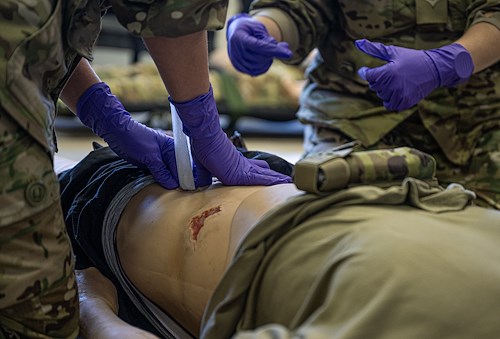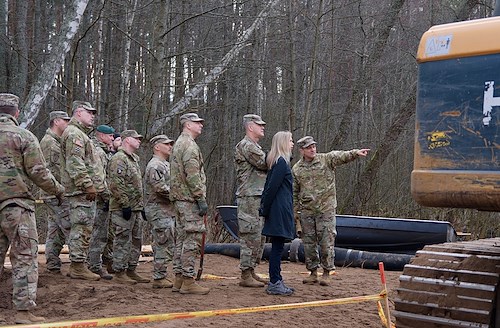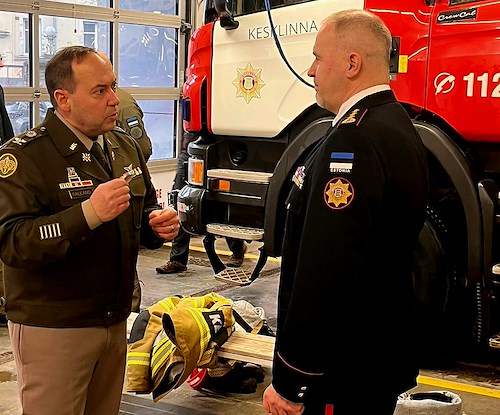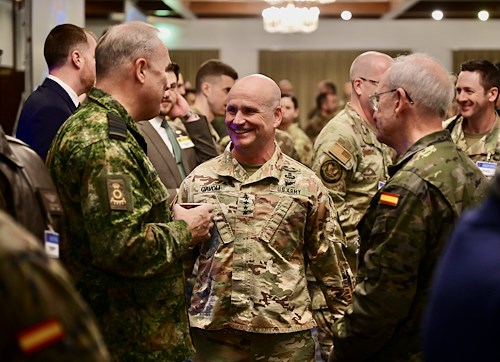Gallery contains 3 images
×
Photo 1 of 3
Ramstein hosts multi-national aero-medical exchange
Airmen assigned to U.S. Air Forces in Europe and Air Forces Africa conduct in-depth familiarization training on aeromedical evacuation with NATO Allies Denmark and Bulgaria as well as U.S. partner nation Serbia at Ramstein Air Base and Landstuhl Regional Medical Center in Germany, Nov. 28-Dec. 1, 2023.
Photo by: U.S. Air Forces in Europe and Air Forces Africa
Photo 2 of 3
Ramstein hosts multi-national aero-medical exchange
Airmen assigned to U.S. Air Forces in Europe and Air Forces Africa conduct in-depth familiarization training on aeromedical evacuation with NATO Allies Denmark and Bulgaria as well as U.S. partner nation Serbia at Ramstein Air Base and Landstuhl Regional Medical Center in Germany, Nov. 28-Dec. 1, 2023.
Photo by: U.S. Air Forces in Europe and Air Forces Africa
Photo 3 of 3
Ramstein hosts multi-national aero-medical exchange
Airmen assigned to U.S. Air Forces in Europe and Air Forces Africa conduct in-depth familiarization training on aeromedical evacuation with NATO Allies Denmark and Bulgaria as well as U.S. partner nation Serbia at Ramstein Air Base and Landstuhl Regional Medical Center in Germany, Nov. 28-Dec. 1, 2023.
Photo by: U.S. Air Forces in Europe and Air Forces Africa
RAMSTEIN AIR BASE, Germany -- The command surgeon of the U.S. Air Forces in Europe and Air Forces Africa and Landstuhl Regional Medical Center recently hosted a medical knowledge exchange with NATO Allies Denmark and Bulgaria as well as U.S. partner nation Serbia at Ramstein Air Base and Landstuhl.
Leveraging local medical expertise, this event featured in-depth familiarization with the aeromedical evacuation activities at Ramstein and the medical simulation laboratory at Landstuhl. The event gave participants an opportunity to exchange information and share experiences to further integrate them with each nation’s unique mission sets, while forming aero-medical best practices.
"This is a great chance for key medical personnel in Serbia, Bulgaria and Denmark to make lasting connections with each other and with U.S. personnel to develop sustainable relationships that serve as a starting point to share best methods for many years to come," said U.S. Air Force Lt. Col. Joel Foster, USAFE-AFAFRICA Office of the Command Surgeon’s global health engagements branch chief. "In this way, each country benefits from advancements in technology, processes and procedures for patient care and movement across the battlespace."
"This workshop is more than just a meeting of minds," said U.S. Air Force Maj. Lyubormir Angelov, USAFE-AFAFRICA Office of the Command Surgeon international health specialist. "It's a testament to the unwavering commitment to advancing military medicine and solidifying an alliance that transcends borders. We are proud to have NATO and partners here to make us stronger together."
The military medical professionals from the four nations participated in multiple scenarios to discuss how each nation achieves intended results and ways to combine them into best practices.
Attendees also visited a number of locations, including the Landstuhl Regional Medical Center and its simulation center, Ramstein’s En-Route Patient Staging Flight, Theater Patient Movement Requirement Center, 86th Aeromedical Evacuation Squadron, 86th Medical Group Simulation (MDG) Center and its Flight Medicine operations.
"The aim of this assembly is significant, offering an unmatched opportunity for partnership nation members to collaborate with U.S. subject matter experts," Angelov said. "Collectively, we explored the intricacies of aerospace medicine, aeromedical evacuation, patient movement and enhanced our simulation centers, creating a fertile ground for events like these."
"The event is designed to showcase the latest aeromedical evacuation procedures and equipment on a U.S. airbase to our partner nations," said U.S. Air Force Maj. Nicola Morrison, USAFE-AFAFRICA Office of the Command Surgeon’s Europe global health engagement team chief.
Each of the participants from the four nations walked away from this knowledge exchange with uniquely different takeaways. For Angelov, it was about how medics come together to learn from each other and strengthen ties and partnerships.
"This is important for us to compare and contrast how we do business in our aerospace medical program," said Bulgarian Air Force 2nd Lt. Boryana Ralcheva, medical simulation training center instructor. "We want to see what works here and see if we can apply it to our program. We do not want to invent something new if it is already in service. This is a great opportunity for us, and I look forward to the next knowledge exchange."
According to the Bulgarian surgeon general, Maj. Gen. Ventsislav Mutafchiyski, M.D., this event holds a significant importance for Bulgaria as it provides an exceptional opportunity for Partnership Network members to observe and learn from U.S. SMEs and programs. He added, “the impact of this event on Bulgaria's progress is profound, positively influencing all four milestones: Aerospace Medicine, Simulation Center enhancement, Role 1 and Role 2 development and Force Health Protection."
Army, Navy, Air Force and Marine Corps global health engagement professionals work for months on these events, synchronizing details with dozens of planners, liaisons and subject-matter experts to improve medical capabilities among partner nations throughout USEUCOM’s theater.
"The participation of multiple Allies and partners sharing knowledge on several medical capabilities in one event is a very efficient use of limited resources, while enhancing interoperability,” said U.S. Air Force Col. James Chambers, U.S. European Command’s surgeon. “This engagement also reinforces key relationships between U.S., Bulgarian, Danish and Serbian professionals, enhancing understanding and trust as we improve critical wartime capabilities."













